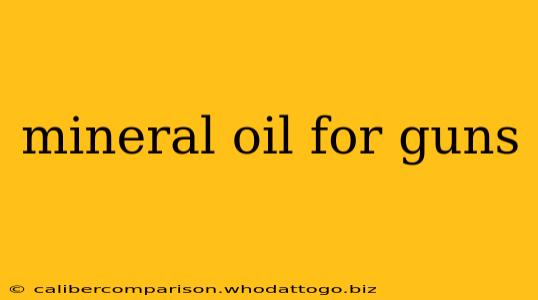Mineral oil has long been a staple in gun cleaning and lubrication, prized for its affordability and effectiveness. But is it the best choice for your firearms? This comprehensive guide delves into the pros and cons of using mineral oil for gun maintenance, helping you make an informed decision for your specific needs.
Understanding Mineral Oil's Role in Gun Care
Mineral oil, a refined petroleum product, offers several benefits as a gun lubricant:
- Cost-Effective: Mineral oil is significantly cheaper than specialized gun oils, making it an attractive option for budget-conscious gun owners.
- Readily Available: It's easily found in pharmacies, grocery stores, and online retailers, ensuring convenient access.
- Good Lubrication: Mineral oil provides adequate lubrication for many firearm mechanisms, reducing friction and wear.
- Corrosion Resistance (to a degree): While not a dedicated rust preventative, mineral oil provides a basic level of protection against moisture and corrosion.
When Mineral Oil Shines: Ideal Applications
Mineral oil excels in certain situations:
- Storage: For long-term storage, a light coat of mineral oil can help protect metal surfaces from rust and corrosion. This is especially useful for firearms stored in less-than-ideal conditions.
- Basic Cleaning: After cleaning your firearm with a solvent, a light application of mineral oil can help remove lingering residue and protect the metal. It's best used as a final step after thorough cleaning.
- Emergency Lubrication: If you find yourself unexpectedly needing lubrication in the field and don't have specialized gun oil on hand, mineral oil can provide a temporary solution.
Limitations of Mineral Oil: Where it Falls Short
Despite its advantages, mineral oil has limitations:
- Not a Superior Lubricant: Compared to modern gun oils formulated with specific additives, mineral oil offers inferior lubrication in high-stress applications. It can break down under extreme heat and pressure, leading to increased wear.
- Can Attract Dirt and Grime: Unlike specialized gun oils, mineral oil can attract and retain dirt and debris, potentially leading to fouling and malfunction.
- Limited Corrosion Protection: While offering basic protection, mineral oil doesn't provide the robust corrosion inhibition of dedicated rust preventatives. It's not a suitable substitute for dedicated rust-preventative oils or sprays, especially in humid environments.
- May Not Be Suitable for All Firearms: Some firearms with delicate mechanisms or high-precision components may benefit from more specialized lubricants designed for their specific needs.
Mineral Oil vs. Specialized Gun Oils: Key Differences
The choice between mineral oil and specialized gun oils depends on your needs and priorities. Specialized gun oils usually contain additives that enhance:
- Lubrication: Providing smoother operation and reduced wear.
- Corrosion Protection: Offering superior protection against rust and corrosion.
- Cleanliness: Reducing the attraction of dirt and debris.
- High-Temperature Stability: Maintaining lubrication even under extreme conditions.
Best Practices for Using Mineral Oil on Firearms
When using mineral oil for gun maintenance, follow these best practices:
- Use sparingly: Apply only a thin coat, avoiding excess accumulation.
- Wipe off excess: Remove any excess oil with a clean, lint-free cloth.
- Proper cleaning: Always clean your firearm thoroughly before applying any lubricant.
- Choose refined mineral oil: Opt for a highly refined mineral oil to minimize impurities.
Conclusion: A Place for Mineral Oil in Your Gun Care Arsenal
Mineral oil can be a valuable tool in your gun care arsenal, particularly for basic cleaning, storage, and emergency situations. However, it's crucial to understand its limitations. For optimal performance, longevity, and protection, specialized gun oils are often a superior choice, especially for regular use and high-stress applications. Choose the lubricant that best meets the specific needs of your firearms and your shooting environment.

